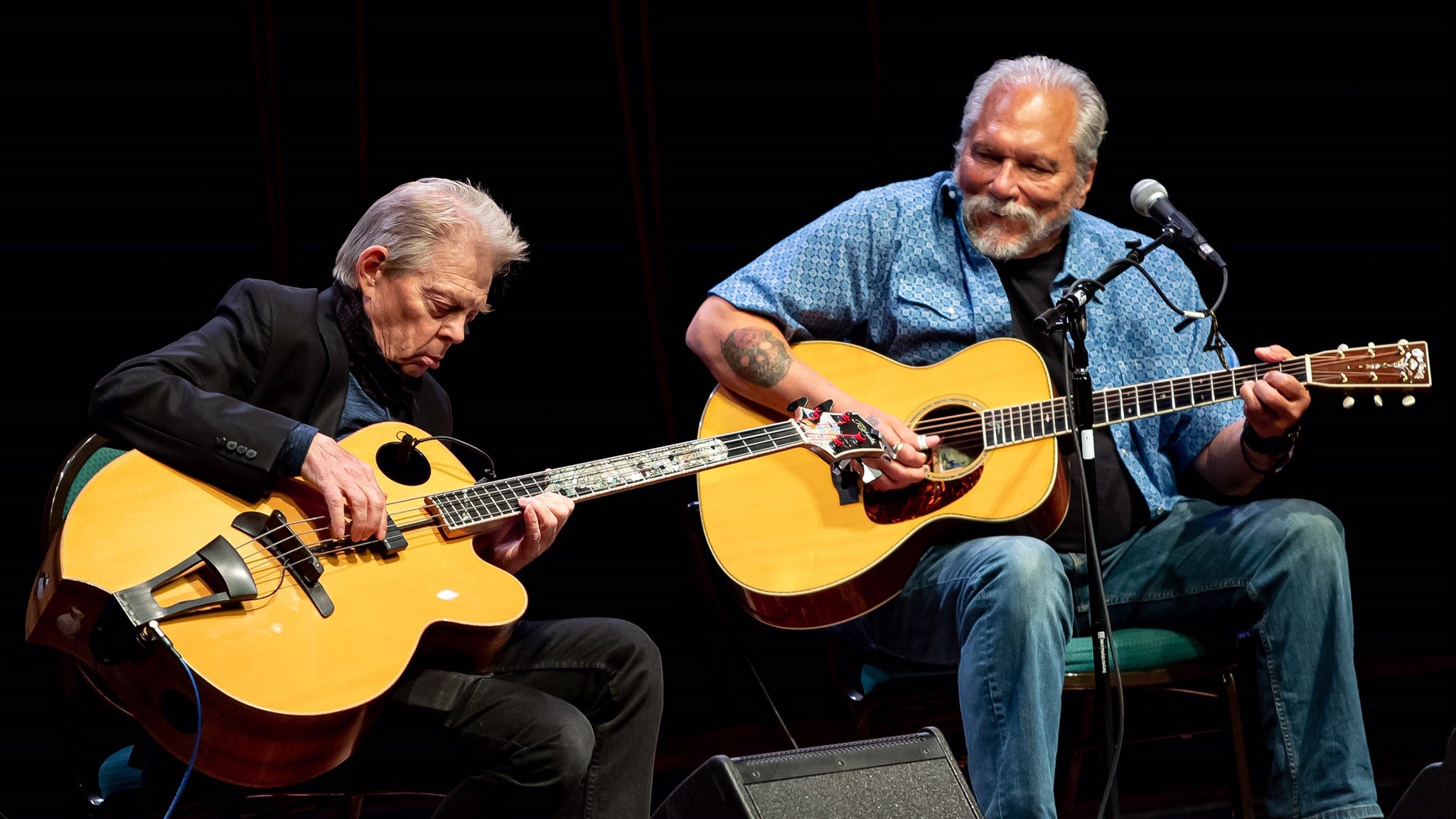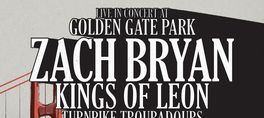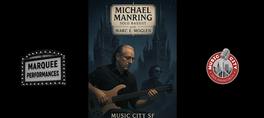The name Hot Tuna invokes as many different moods and reactions as there are Hot Tuna fans -- millions of them. To some, Hot Tuna is a reminder of some wild and happy times. To others, that name will forever be linked to their own discovery of the power and depth of American blues and roots music. To newer fans, Hot Tuna is a tight, masterful duo that is on the cutting edge of great music.
All of those things are correct, and more. For more than four decades, Hot Tuna has played, toured, and recorded some of the best and most memorable acoustic and electric music ever. And Hot Tuna is still going strong -- some would say stronger than ever.
The two kids from 1950s Washington, D.C. knew that they wanted to make music. Jorma Kaukonen, son of a State Department official, and Jack Casady, whose father was a dentist, discovered guitar when they were teenagers (Jack, four years younger, barely so). They played, and they took in the vast panorama of music available in the nation's capital, but found a special love of the blues, country, and jazz played in small clubs.
Jorma went off to college, while Jack sat in with professional bands and combos before he was even old enough to drive, first playing lead guitar, then electric bass.
In the mid-1960s Jorma was invited to play in a rock'n'roll band that was forming in San Francisco; he knew just the guy to play bass and summoned his old friend from back east. The striking signature guitar and bass riffs in the now-legendary songs by the Jefferson Airplane were the result.
The half-decade foray into 1960s San Francisco rock music was for Jack and Jorma an additional destination, not the final one. They continued to play their acoustic blues on the side, sometimes performing a mini-concert amid a Jefferson Airplane performance, sometimes finding a gig afterwards in some local club. They were, as Jack says, "Scouting, always scouting, for places where we could play."
The duo did not go unnoticed and soon there was a record contract and not long afterwards a tour. Thus began a career that would result in more than two-dozen albums, thousands of concerts around the world, and continued popularity.
Hot Tuna has gone through changes, certainly. A variety of other instruments, from harmonica to fiddle to keyboards, have been part of the band over the years, and continue to be, varying from project to project. The constant, the very definition of Hot Tuna, has always been Jorma and Jack.
The two are not joined at the hip, though; through the years both Jorma and Jack have undertaken projects with other musicians and solo projects of their own. But Hot Tuna has never broken up, never ceased to exist, nor have the two boyhood pals ever wavered in one of the most enduring friendships in music.
Along the way, they have been joined by a succession of talented musicians: Drummers, harmonica players, keyboardists, backup singers, violinists and more, all fitting with Jorma and Jack's current place in the musical spectrum. Jorma and Jack certainly could not have imagined, let alone predicted, where the playing would take them. It's been a long and fascinating road to numerous, exciting destinations. Two things have never changed: They still love playing as much as they did as kids in Washington, D.C. and there are still many, many exciting miles yet to travel on their musical odyssey.
David Bromberg Quintet
He's played with everyone, he's toured everywhere, he can lead a raucous big band or hold an audience silent with a solo acoustic blues. Here's the story of David Bromberg, or at least some of it...
Born in Philadelphia in 1945 and raised in Tarrytown, NY, "as a kid I listened to rock 'n' roll and whatever else was on the radio," says Bromberg. "I discovered Pete Seeger and The Weavers and, through them, Reverend Gary Davis. I then discovered Big Bill Broonzy, who led me to Muddy Waters and the Chicago blues. This was more or less the same time I discovered Flatt and Scruggs, which led to Bill Monroe and Doc Watson."
Bromberg began studying guitar-playing when he was 13 and eventually enrolled in Columbia University as a musicology major. The call of the Greenwich Village folk scene in the mid-'60s drew David to the downtown clubs and coffeehouses, where he could watch and learn from the best performers, including primary sources such as his inspiration and teacher, the Reverend Gary Davis.
Bromberg's sensitive and versatile approach to guitar-playing earned him jobs playing the Village "basket houses" for tips, the occasional paying gig, and lots of employment as a backing musician for Tom Paxton, Jerry Jeff Walker and Rosalie Sorrels, among others. He became a first-call, "hired gun" guitarist for recording sessions, ultimately playing on hundreds of records by artists including Bob Dylan (New Morning, Self Portrait, Dylan), Link Wray, The Eagles, Ringo Starr, Willie Nelson, and Carly Simon.
An unexpected and wildly successful solo spot at the 1970 Isle of Wight Festival in Great Britain led to a solo deal with Columbia Records, for whom David recorded four albums. His eponymous 1971 debut not only included the mock-anguished "Suffer to Sing the Blues," a Bromberg original that became an FM radio staple, but also "The Holdup," a songwriting collaboration with former Beatle George Harrison, whom he met at his manager's Thanksgiving dinner festivities. Harrison also played slide guitar on the track. Through Bromberg's manager, Al Aronowitz, David also met the Grateful Dead and wound up with four of their members, including Jerry Garcia, playing on his next two albums.
Bromberg's range of material, based in the folk and blues idioms, continually expanded with each new album to encompass bluegrass, ragtime, country and ethnic music, and his touring band grew apace. By the mid-'70s, the David Bromberg Big Band included horn-players, a violinist, and several multi-instrumentalists, including David himself. Among the best-known Bromberg Band graduates: mandolinist Andy Statman, later a major figure in the Klezmer music movement in America, and fiddler Jay Ungar (who wrote the memorable "Ashokan Farewell" for Ken Burns' PBS documentary, "The Civil War").
Despite jubilant, loose-limbed concerts and a string of acclaimed albums on the Fantasy label, Bromberg found himself exhausted by the logistics of the music business. "I decided to change the direction of my life," he explains. So David dissolved his band in 1980, and he and his artist/musician wife, Nancy Josephson, moved from Northern California to Chicago, where David attended the Kenneth Warren School of Violin Making. Though he still toured periodically, the recordings slowed to a trickle and then stopped.
After "too many Chicago winters," in 2002 David and Nancy were lured to Wilmington, Del., where they became part of the city's artist-in-residence program and where David could establish David Bromberg Fine Violins, a retail store and repair shop for high quality instruments. Frequent participation in the city's weekly jam sessions helped rekindle Bromberg's desire to make music again, as did the encouragement of fellow musicians Chris Hillman (The Byrds, Desert Rose Band, Flying Burrito Brothers) and bluegrass wizard Herb Pedersen, and David's manager, Steve Bailey. The jams also led to the formation of Angel Band, fronted by Nancy and two other female vocalists, with David serving as an accompanist.
With the release of Try Me One More Time, David continues his musical revitalization, playing shows on his own, backed by (and supporting) Angel Band, his own David Bromberg Quartet, and reunions of the David Bromberg Big Band, the configuration depending on the circumstance. Listen for that joyful noise - David Bromberg's back!
show less
All of those things are correct, and more. For more than four decades, Hot Tuna has played, toured, and recorded some of the best and most memorable acoustic and electric music ever. And Hot Tuna is still going strong -- some would say stronger than ever.
The two kids from 1950s Washington, D.C. knew that they wanted to make music. Jorma Kaukonen, son of a State Department official, and Jack Casady, whose father was a dentist, discovered guitar when they were teenagers (Jack, four years younger, barely so). They played, and they took in the vast panorama of music available in the nation's capital, but found a special love of the blues, country, and jazz played in small clubs.
Jorma went off to college, while Jack sat in with professional bands and combos before he was even old enough to drive, first playing lead guitar, then electric bass.
In the mid-1960s Jorma was invited to play in a rock'n'roll band that was forming in San Francisco; he knew just the guy to play bass and summoned his old friend from back east. The striking signature guitar and bass riffs in the now-legendary songs by the Jefferson Airplane were the result.
The half-decade foray into 1960s San Francisco rock music was for Jack and Jorma an additional destination, not the final one. They continued to play their acoustic blues on the side, sometimes performing a mini-concert amid a Jefferson Airplane performance, sometimes finding a gig afterwards in some local club. They were, as Jack says, "Scouting, always scouting, for places where we could play."
The duo did not go unnoticed and soon there was a record contract and not long afterwards a tour. Thus began a career that would result in more than two-dozen albums, thousands of concerts around the world, and continued popularity.
Hot Tuna has gone through changes, certainly. A variety of other instruments, from harmonica to fiddle to keyboards, have been part of the band over the years, and continue to be, varying from project to project. The constant, the very definition of Hot Tuna, has always been Jorma and Jack.
The two are not joined at the hip, though; through the years both Jorma and Jack have undertaken projects with other musicians and solo projects of their own. But Hot Tuna has never broken up, never ceased to exist, nor have the two boyhood pals ever wavered in one of the most enduring friendships in music.
Along the way, they have been joined by a succession of talented musicians: Drummers, harmonica players, keyboardists, backup singers, violinists and more, all fitting with Jorma and Jack's current place in the musical spectrum. Jorma and Jack certainly could not have imagined, let alone predicted, where the playing would take them. It's been a long and fascinating road to numerous, exciting destinations. Two things have never changed: They still love playing as much as they did as kids in Washington, D.C. and there are still many, many exciting miles yet to travel on their musical odyssey.
David Bromberg Quintet
He's played with everyone, he's toured everywhere, he can lead a raucous big band or hold an audience silent with a solo acoustic blues. Here's the story of David Bromberg, or at least some of it...
Born in Philadelphia in 1945 and raised in Tarrytown, NY, "as a kid I listened to rock 'n' roll and whatever else was on the radio," says Bromberg. "I discovered Pete Seeger and The Weavers and, through them, Reverend Gary Davis. I then discovered Big Bill Broonzy, who led me to Muddy Waters and the Chicago blues. This was more or less the same time I discovered Flatt and Scruggs, which led to Bill Monroe and Doc Watson."
Bromberg began studying guitar-playing when he was 13 and eventually enrolled in Columbia University as a musicology major. The call of the Greenwich Village folk scene in the mid-'60s drew David to the downtown clubs and coffeehouses, where he could watch and learn from the best performers, including primary sources such as his inspiration and teacher, the Reverend Gary Davis.
Bromberg's sensitive and versatile approach to guitar-playing earned him jobs playing the Village "basket houses" for tips, the occasional paying gig, and lots of employment as a backing musician for Tom Paxton, Jerry Jeff Walker and Rosalie Sorrels, among others. He became a first-call, "hired gun" guitarist for recording sessions, ultimately playing on hundreds of records by artists including Bob Dylan (New Morning, Self Portrait, Dylan), Link Wray, The Eagles, Ringo Starr, Willie Nelson, and Carly Simon.
An unexpected and wildly successful solo spot at the 1970 Isle of Wight Festival in Great Britain led to a solo deal with Columbia Records, for whom David recorded four albums. His eponymous 1971 debut not only included the mock-anguished "Suffer to Sing the Blues," a Bromberg original that became an FM radio staple, but also "The Holdup," a songwriting collaboration with former Beatle George Harrison, whom he met at his manager's Thanksgiving dinner festivities. Harrison also played slide guitar on the track. Through Bromberg's manager, Al Aronowitz, David also met the Grateful Dead and wound up with four of their members, including Jerry Garcia, playing on his next two albums.
Bromberg's range of material, based in the folk and blues idioms, continually expanded with each new album to encompass bluegrass, ragtime, country and ethnic music, and his touring band grew apace. By the mid-'70s, the David Bromberg Big Band included horn-players, a violinist, and several multi-instrumentalists, including David himself. Among the best-known Bromberg Band graduates: mandolinist Andy Statman, later a major figure in the Klezmer music movement in America, and fiddler Jay Ungar (who wrote the memorable "Ashokan Farewell" for Ken Burns' PBS documentary, "The Civil War").
Despite jubilant, loose-limbed concerts and a string of acclaimed albums on the Fantasy label, Bromberg found himself exhausted by the logistics of the music business. "I decided to change the direction of my life," he explains. So David dissolved his band in 1980, and he and his artist/musician wife, Nancy Josephson, moved from Northern California to Chicago, where David attended the Kenneth Warren School of Violin Making. Though he still toured periodically, the recordings slowed to a trickle and then stopped.
After "too many Chicago winters," in 2002 David and Nancy were lured to Wilmington, Del., where they became part of the city's artist-in-residence program and where David could establish David Bromberg Fine Violins, a retail store and repair shop for high quality instruments. Frequent participation in the city's weekly jam sessions helped rekindle Bromberg's desire to make music again, as did the encouragement of fellow musicians Chris Hillman (The Byrds, Desert Rose Band, Flying Burrito Brothers) and bluegrass wizard Herb Pedersen, and David's manager, Steve Bailey. The jams also led to the formation of Angel Band, fronted by Nancy and two other female vocalists, with David serving as an accompanist.
With the release of Try Me One More Time, David continues his musical revitalization, playing shows on his own, backed by (and supporting) Angel Band, his own David Bromberg Quartet, and reunions of the David Bromberg Big Band, the configuration depending on the circumstance. Listen for that joyful noise - David Bromberg's back!
The name Hot Tuna invokes as many different moods and reactions as there are Hot Tuna fans -- millions of them. To some, Hot Tuna is a reminder of some wild and happy times. To others, that name will forever be linked to their own discovery of the power and depth of American blues and roots music. To newer fans, Hot Tuna is a tight, masterful duo that is on the cutting edge of great music.
All of those things are correct, and more. For more than four decades, Hot Tuna has played, toured, and recorded some of the best and most memorable acoustic and electric music ever. And Hot Tuna is still going strong -- some would say stronger than ever.
The two kids from 1950s Washington, D.C. knew that they wanted to make music. Jorma Kaukonen, son of a State Department official, and Jack Casady, whose father was a dentist, discovered guitar when they were teenagers (Jack, four years younger, barely so). They played, and they took in the vast panorama of music available in the nation's capital, but found a special love of the blues, country, and jazz played in small clubs.
Jorma went off to college, while Jack sat in with professional bands and combos before he was even old enough to drive, first playing lead guitar, then electric bass.
In the mid-1960s Jorma was invited to play in a rock'n'roll band that was forming in San Francisco; he knew just the guy to play bass and summoned his old friend from back east. The striking signature guitar and bass riffs in the now-legendary songs by the Jefferson Airplane were the result.
The half-decade foray into 1960s San Francisco rock music was for Jack and Jorma an additional destination, not the final one. They continued to play their acoustic blues on the side, sometimes performing a mini-concert amid a Jefferson Airplane performance, sometimes finding a gig afterwards in some local club. They were, as Jack says, "Scouting, always scouting, for places where we could play."
The duo did not go unnoticed and soon there was a record contract and not long afterwards a tour. Thus began a career that would result in more than two-dozen albums, thousands of concerts around the world, and continued popularity.
Hot Tuna has gone through changes, certainly. A variety of other instruments, from harmonica to fiddle to keyboards, have been part of the band over the years, and continue to be, varying from project to project. The constant, the very definition of Hot Tuna, has always been Jorma and Jack.
The two are not joined at the hip, though; through the years both Jorma and Jack have undertaken projects with other musicians and solo projects of their own. But Hot Tuna has never broken up, never ceased to exist, nor have the two boyhood pals ever wavered in one of the most enduring friendships in music.
Along the way, they have been joined by a succession of talented musicians: Drummers, harmonica players, keyboardists, backup singers, violinists and more, all fitting with Jorma and Jack's current place in the musical spectrum. Jorma and Jack certainly could not have imagined, let alone predicted, where the playing would take them. It's been a long and fascinating road to numerous, exciting destinations. Two things have never changed: They still love playing as much as they did as kids in Washington, D.C. and there are still many, many exciting miles yet to travel on their musical odyssey.
David Bromberg Quintet
He's played with everyone, he's toured everywhere, he can lead a raucous big band or hold an audience silent with a solo acoustic blues. Here's the story of David Bromberg, or at least some of it...
Born in Philadelphia in 1945 and raised in Tarrytown, NY, "as a kid I listened to rock 'n' roll and whatever else was on the radio," says Bromberg. "I discovered Pete Seeger and The Weavers and, through them, Reverend Gary Davis. I then discovered Big Bill Broonzy, who led me to Muddy Waters and the Chicago blues. This was more or less the same time I discovered Flatt and Scruggs, which led to Bill Monroe and Doc Watson."
Bromberg began studying guitar-playing when he was 13 and eventually enrolled in Columbia University as a musicology major. The call of the Greenwich Village folk scene in the mid-'60s drew David to the downtown clubs and coffeehouses, where he could watch and learn from the best performers, including primary sources such as his inspiration and teacher, the Reverend Gary Davis.
Bromberg's sensitive and versatile approach to guitar-playing earned him jobs playing the Village "basket houses" for tips, the occasional paying gig, and lots of employment as a backing musician for Tom Paxton, Jerry Jeff Walker and Rosalie Sorrels, among others. He became a first-call, "hired gun" guitarist for recording sessions, ultimately playing on hundreds of records by artists including Bob Dylan (New Morning, Self Portrait, Dylan), Link Wray, The Eagles, Ringo Starr, Willie Nelson, and Carly Simon.
An unexpected and wildly successful solo spot at the 1970 Isle of Wight Festival in Great Britain led to a solo deal with Columbia Records, for whom David recorded four albums. His eponymous 1971 debut not only included the mock-anguished "Suffer to Sing the Blues," a Bromberg original that became an FM radio staple, but also "The Holdup," a songwriting collaboration with former Beatle George Harrison, whom he met at his manager's Thanksgiving dinner festivities. Harrison also played slide guitar on the track. Through Bromberg's manager, Al Aronowitz, David also met the Grateful Dead and wound up with four of their members, including Jerry Garcia, playing on his next two albums.
Bromberg's range of material, based in the folk and blues idioms, continually expanded with each new album to encompass bluegrass, ragtime, country and ethnic music, and his touring band grew apace. By the mid-'70s, the David Bromberg Big Band included horn-players, a violinist, and several multi-instrumentalists, including David himself. Among the best-known Bromberg Band graduates: mandolinist Andy Statman, later a major figure in the Klezmer music movement in America, and fiddler Jay Ungar (who wrote the memorable "Ashokan Farewell" for Ken Burns' PBS documentary, "The Civil War").
Despite jubilant, loose-limbed concerts and a string of acclaimed albums on the Fantasy label, Bromberg found himself exhausted by the logistics of the music business. "I decided to change the direction of my life," he explains. So David dissolved his band in 1980, and he and his artist/musician wife, Nancy Josephson, moved from Northern California to Chicago, where David attended the Kenneth Warren School of Violin Making. Though he still toured periodically, the recordings slowed to a trickle and then stopped.
After "too many Chicago winters," in 2002 David and Nancy were lured to Wilmington, Del., where they became part of the city's artist-in-residence program and where David could establish David Bromberg Fine Violins, a retail store and repair shop for high quality instruments. Frequent participation in the city's weekly jam sessions helped rekindle Bromberg's desire to make music again, as did the encouragement of fellow musicians Chris Hillman (The Byrds, Desert Rose Band, Flying Burrito Brothers) and bluegrass wizard Herb Pedersen, and David's manager, Steve Bailey. The jams also led to the formation of Angel Band, fronted by Nancy and two other female vocalists, with David serving as an accompanist.
With the release of Try Me One More Time, David continues his musical revitalization, playing shows on his own, backed by (and supporting) Angel Band, his own David Bromberg Quartet, and reunions of the David Bromberg Big Band, the configuration depending on the circumstance. Listen for that joyful noise - David Bromberg's back!
read more
All of those things are correct, and more. For more than four decades, Hot Tuna has played, toured, and recorded some of the best and most memorable acoustic and electric music ever. And Hot Tuna is still going strong -- some would say stronger than ever.
The two kids from 1950s Washington, D.C. knew that they wanted to make music. Jorma Kaukonen, son of a State Department official, and Jack Casady, whose father was a dentist, discovered guitar when they were teenagers (Jack, four years younger, barely so). They played, and they took in the vast panorama of music available in the nation's capital, but found a special love of the blues, country, and jazz played in small clubs.
Jorma went off to college, while Jack sat in with professional bands and combos before he was even old enough to drive, first playing lead guitar, then electric bass.
In the mid-1960s Jorma was invited to play in a rock'n'roll band that was forming in San Francisco; he knew just the guy to play bass and summoned his old friend from back east. The striking signature guitar and bass riffs in the now-legendary songs by the Jefferson Airplane were the result.
The half-decade foray into 1960s San Francisco rock music was for Jack and Jorma an additional destination, not the final one. They continued to play their acoustic blues on the side, sometimes performing a mini-concert amid a Jefferson Airplane performance, sometimes finding a gig afterwards in some local club. They were, as Jack says, "Scouting, always scouting, for places where we could play."
The duo did not go unnoticed and soon there was a record contract and not long afterwards a tour. Thus began a career that would result in more than two-dozen albums, thousands of concerts around the world, and continued popularity.
Hot Tuna has gone through changes, certainly. A variety of other instruments, from harmonica to fiddle to keyboards, have been part of the band over the years, and continue to be, varying from project to project. The constant, the very definition of Hot Tuna, has always been Jorma and Jack.
The two are not joined at the hip, though; through the years both Jorma and Jack have undertaken projects with other musicians and solo projects of their own. But Hot Tuna has never broken up, never ceased to exist, nor have the two boyhood pals ever wavered in one of the most enduring friendships in music.
Along the way, they have been joined by a succession of talented musicians: Drummers, harmonica players, keyboardists, backup singers, violinists and more, all fitting with Jorma and Jack's current place in the musical spectrum. Jorma and Jack certainly could not have imagined, let alone predicted, where the playing would take them. It's been a long and fascinating road to numerous, exciting destinations. Two things have never changed: They still love playing as much as they did as kids in Washington, D.C. and there are still many, many exciting miles yet to travel on their musical odyssey.
David Bromberg Quintet
He's played with everyone, he's toured everywhere, he can lead a raucous big band or hold an audience silent with a solo acoustic blues. Here's the story of David Bromberg, or at least some of it...
Born in Philadelphia in 1945 and raised in Tarrytown, NY, "as a kid I listened to rock 'n' roll and whatever else was on the radio," says Bromberg. "I discovered Pete Seeger and The Weavers and, through them, Reverend Gary Davis. I then discovered Big Bill Broonzy, who led me to Muddy Waters and the Chicago blues. This was more or less the same time I discovered Flatt and Scruggs, which led to Bill Monroe and Doc Watson."
Bromberg began studying guitar-playing when he was 13 and eventually enrolled in Columbia University as a musicology major. The call of the Greenwich Village folk scene in the mid-'60s drew David to the downtown clubs and coffeehouses, where he could watch and learn from the best performers, including primary sources such as his inspiration and teacher, the Reverend Gary Davis.
Bromberg's sensitive and versatile approach to guitar-playing earned him jobs playing the Village "basket houses" for tips, the occasional paying gig, and lots of employment as a backing musician for Tom Paxton, Jerry Jeff Walker and Rosalie Sorrels, among others. He became a first-call, "hired gun" guitarist for recording sessions, ultimately playing on hundreds of records by artists including Bob Dylan (New Morning, Self Portrait, Dylan), Link Wray, The Eagles, Ringo Starr, Willie Nelson, and Carly Simon.
An unexpected and wildly successful solo spot at the 1970 Isle of Wight Festival in Great Britain led to a solo deal with Columbia Records, for whom David recorded four albums. His eponymous 1971 debut not only included the mock-anguished "Suffer to Sing the Blues," a Bromberg original that became an FM radio staple, but also "The Holdup," a songwriting collaboration with former Beatle George Harrison, whom he met at his manager's Thanksgiving dinner festivities. Harrison also played slide guitar on the track. Through Bromberg's manager, Al Aronowitz, David also met the Grateful Dead and wound up with four of their members, including Jerry Garcia, playing on his next two albums.
Bromberg's range of material, based in the folk and blues idioms, continually expanded with each new album to encompass bluegrass, ragtime, country and ethnic music, and his touring band grew apace. By the mid-'70s, the David Bromberg Big Band included horn-players, a violinist, and several multi-instrumentalists, including David himself. Among the best-known Bromberg Band graduates: mandolinist Andy Statman, later a major figure in the Klezmer music movement in America, and fiddler Jay Ungar (who wrote the memorable "Ashokan Farewell" for Ken Burns' PBS documentary, "The Civil War").
Despite jubilant, loose-limbed concerts and a string of acclaimed albums on the Fantasy label, Bromberg found himself exhausted by the logistics of the music business. "I decided to change the direction of my life," he explains. So David dissolved his band in 1980, and he and his artist/musician wife, Nancy Josephson, moved from Northern California to Chicago, where David attended the Kenneth Warren School of Violin Making. Though he still toured periodically, the recordings slowed to a trickle and then stopped.
After "too many Chicago winters," in 2002 David and Nancy were lured to Wilmington, Del., where they became part of the city's artist-in-residence program and where David could establish David Bromberg Fine Violins, a retail store and repair shop for high quality instruments. Frequent participation in the city's weekly jam sessions helped rekindle Bromberg's desire to make music again, as did the encouragement of fellow musicians Chris Hillman (The Byrds, Desert Rose Band, Flying Burrito Brothers) and bluegrass wizard Herb Pedersen, and David's manager, Steve Bailey. The jams also led to the formation of Angel Band, fronted by Nancy and two other female vocalists, with David serving as an accompanist.
With the release of Try Me One More Time, David continues his musical revitalization, playing shows on his own, backed by (and supporting) Angel Band, his own David Bromberg Quartet, and reunions of the David Bromberg Big Band, the configuration depending on the circumstance. Listen for that joyful noise - David Bromberg's back!
show less
Date/Times:
The Fillmore
24 Upcoming Events
1805 Geary Blvd, San Francisco, CA 94115
The Best Events
Every Week in Your Inbox
From Our Sponsors
UPCOMING EVENTS
Great suggestion! We'll be in touch.
Event reviewed successfully.









